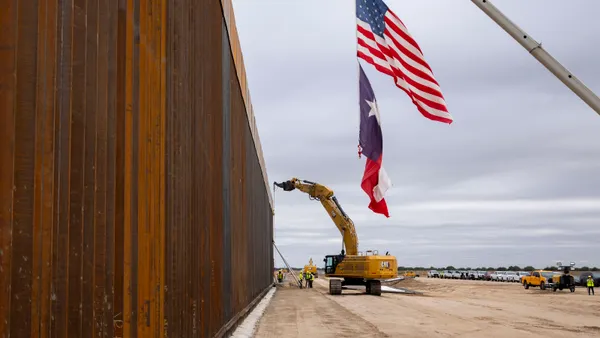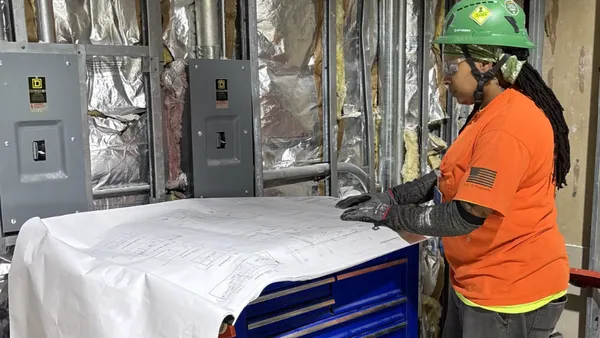Approximately 250,000 people leave military service each year and begin the often bumpy process of re-entering civilian life, a large part of which is finding a suitable career. As construction continues to grapple with a chronic workforce shortage, the numbers of new veterans alone represent enormous potential for the construction industry.
Transitioning military members and veterans are a natural fit for construction, which demands problem-solving, loyalty and onsite decision making — all of which are skills the military instills in its servicemembers. Veteran-specific organizations and construction companies alike recognize the opportunity for this demographic in the industry.
Military members undergo training like few other people do. Following rules and procedures, working as a team and placing absolute trust in colleagues can mean the difference between life and death. Tony DeStefano, vice president of human resources at Skanska USA and former captain in the U.S. Army, said military personnel learn to function in very diverse teams, and have ingrained skillsets that can seamlessly transfer to the construction industry and jobsites.
"Particularly, they have a high focus on teamwork and safety, which is critical for success and longevity," he said. "They also have a heightened sense of duty, understanding that the whole is only as strong as its individual parts, and are organized, self-disciplined and are great problem solvers."
Military to civilian transition
After Navy diver Dave Guerra left the military in 1996, he entered the world of commercial diving before beginning and serving as president his company, Puente Technology LLC, which focuses on construction but also has an IT division. "When I was diving, I did underwater construction, rigging, bridgework, inspections, welding and mechanical," he said. "Construction was a natural process to go into."
The transition wasn't seamless, though. Despite being a veteran-owned, service-disabled company, Guerra still faced typical business challenges, such as securing loans, bonding and insurance. "There's no automatic 'just because you’re a veteran-owned company,' " he said. "It's just a license to drive. You have to build those relationships and still deliver in the best way you can because you're opening doors for other veteran companies trying to get in the market. You’re an ambassador for people behind you."
His 8(a)-designated business, a small business assistance program for businesses owned at least 51% by socially or economically disadvantaged individuals, helps it get sole source on $4 to $6 million projects and get federal work. "It helps grow and establish the business to continue in the commercial market or as a federal contractor," Guerra said.
Guerra, who also serves on the board of directors for the National Veteran-owned Business Association, hopes to expand his 10-person company, but emphasizes the importance of growing smartly as opportunities come along.
"We'd like to hire more veterans. They know how to lead, follow, show up and take pride in what they do," he said. "It's a commitment I have as a company owner to help veterans transition. It's a brotherhood and sisterhood that unless you've experienced it, you don't understand it, but when you're out, you miss it like no other.
"Veterans have done a lot of tasks and have a wealth of experience; we have to be a jack of all trades," he continued. "If you put them in something they’re not as comfortable in, they'll work at it. If you help them flourish, they'll be one of the best employees you've ever had. When you add someone like that to your arsenal and figure out what they get excited about, watch them run. They'll be outstanding."
Ron Olsen, president of construction management firm Vanguard Construction Co. Inc., spent five of his seven and a half years in the Air Force working as a carpenter. He's owned his business since 2013 and is evaluating how best to grow it. He would like to get into the federal job market as a small construction company within the constraints of his bond limit and with healthy competition from other service-disabled veteran-owned small businesses.
"When I'm able to grow and hire more people, veterans would be an excellent choice," he said. "From what I experienced in my years as active duty and another 15 years working solely on government contracts, they are more motivated, better educated, have more hands-on experience and are extremely disciplined. You couldn't ask for a better workforce."
Training for a career
When Vietnam War veteran Bob Luckett came home from the service, he entered the construction industry, where he spent the next 50 years. Three years ago, he sold his company with the intent to retire, but realized he wasn't quite ready for full retirement. While doing consulting work, he got the idea to recruit and train veterans in construction. He founded 501(c)(3) Veteran’s Next Mission about a year and a half ago, and is CEO of the eight-person board.
The organization pays veterans while they undergo the three-component training: classroom education; deconstruction, which shows veterans how buildings come apart and allows them to practice with myriad tools; and actual field work for individuals.
"We’re exposing them to all trades,"Luckett said. "We just finished an addition where trainees, under my supervision, did footings, foundation walls, framing, insulation, ductwork, drywall, painting, interior, roofing and siding. It gives them exposure to just about everything."
Fifteen individuals are participating in the four-year program. Most participants have been out of the military for a few years, although they do have some Reservists.
"A machine gunner in the Marine Corps doesn't translate well into civilian life,"Luckett said. "They can find a job, but they can't find a career. They're looking for something to build into a career. This program fills a need in the construction industry, where there is a huge labor shortage and it gives vets a career that'll support them the rest of their lives."
Luckett touts the good fit veterans are for construction. "They're used to following directions, working as a team and working in less than ideal climate conditions. They're loyal," he said, adding: "One thing they like about this training is the camaraderie and being with people with a like background."
Word of mouth, as well as advertising and postings on job search sites like Indeed.com, help populate the program. "A lot of people are looking for construction training,"Luckett said. "Companies need to be willing to put in the time to train these people. They'll reap the reward because of the loyalty they'll get. But they have to put in the time; they can't expect someone to come in and know enough in the first few weeks."
Veteran’s Next Mission is embarking on a warehouse campaign, hoping to acquire a 6,000-square-foot warehouse to use for its deconstruction program component, which gets a lot of donated recycled material. The organization intends to sell some of it and have part of the warehouse designated as a shop, where staff will train disabled veterans to build furniture out of reclaimed materials.
"I've had several disabled veterans talk to me about work and being in the program," Luckett said, "but they can't get around a jobsite. They can, however, get around a concrete floor. They can't lift the kind of load that needs to be lifted on a jobsite, but in a warehouse setting we can rig a lift system."
Home Depot recently announced its charitable arm's, The Home Depot Foundation (HDF), will donate $50 million in the next decade to prepare 20,000 workers for careers in construction. That money will go to the nonprofit Home Builders Institute which, in turn, will train military veterans and active U.S. Army soldiers who are preparing to transition out of the service, along with high school students and disadvantaged youth in the Atlanta area. HDF has worked with the Fort Stewart and Fort Bragg Army bases and had a job placement rate of 90%.
Company recruiting efforts
Skanska USA is one construction company targeting veterans through a national talent acquisition and recruitment program. The company sponsors and attends veteran career fairs throughout the country, as well as running a specific military recruitment campaign — "Pride in Country. Pride in Skanska" — that features military veterans with the company on the job.
Veterans often have a difficult transition from active duty to civilian life. Ever cognizant of that, Skanska USA provides On-the-Job Training (OJT) programs that address construction skills from a field office clerk to an electrician. Internal training programs for all new hires include entry-level rotational programs, an online learning center and mentoring programs.
DeStefano said that the company is always looking to connect with veterans, but that it hopes to connect with service people before their transition to close the gap and lessen the burden. Skanska USA has partnered with RecruitMilitary and finds great value in career fairs, including NC4ME, region-specific veterans job fairs and Salute to America’s Veterans.
"By attending these events, we demonstrate that we have a vested and targeted interest in recruiting, attracting and placing vets with our organization," he said. Many Skanska USA veterans also participate in local organizations.
Military Friendly, owned by Moon Twp., Pa.-based Victory Media, develops audited lists each year of companies with programs targeting transitioning military and veterans. Construction companies with Military Friendly Employer designations include Cajun Industries LLC, Performance Contractors Inc. and Miller-Valentine Group.
Other companies with veteran-specific programs include Gilbane Building Co., Turner Construction and APi Group Inc. The national program Helmets to Hardhats connects military members and veterans with training and career opportunities in construction, as well.
Credentialing
One of the bigger challenges veterans face when searching for a civilian job is translating their military skills into civilian terms. Enter: Hard Hat Heroes, an initiative of NCCER (National Center for Construction Education & Research) that has created a credentialing portal as a way for veterans to receive NCCER credentials for skills and training they received while in the service.
"We have found that military training programs are structured much like construction training programs with objective- and task-based training," said Jennifer Wilkerson, NCCER director of marketing and Build Your Future (BYF). "The qualities instilled in veterans, such as commitment and team work, transition nicely into the type of workforce construction needs."
There are currently 85 alignments available through the portal for the Army, Navy, Marine Corps and Air Force. Each of these alignments were developed with the assistance of industry and military trainers. Their Military Advisory Council is extremely involved every step of the way and includes David Theriot with Performance Contractors, Chris Newton with Cajun Industries, Darren Amick with Bechtel, Shane Hair with Day & Zimmerman and John Boerstler with NextOp.
After the applicant submits the proper paperwork through the portal, Hard Hat Heroes validates the documentation and provides the military member with an NCCER card number and the appropriate credentials.
To date, the portal has credentialed nearly 200 veterans and, through working with the veteran advocacy group NextOp, has placed 50% in jobs. (Some of that 200 number already are employed so therefore don't need job placement assistance.)
The other side of Hard Hat Heroes involves offering employers, contractors and trade associations the opportunity to declare themselves military friendly employers by signing a commitment letter that they put veterans first. After that, their company information goes on Hard Hat Heroes' website, where some veterans start their job search. The Associated Builders and Contractors and Associated General Contractors are among the trade associations affiliated with Hard Hat Heroes.
Human resources representatives also can visit veterans.byf.org and download all of the military occupational specialty (MOS) translation codes, which helps them see where veterans fit into the jobsite and what additional training they might need. "These are basically training prescriptions that allow employers to easily create career development plans for each veteran," said Wilkerson.
Hard Hat Heroes provides this credentialing portal free of charge. "We want to assist our military members in building their careers while at the same time providing the construction industry with committed, qualified professionals," said Wilkerson. "Our veterans have protected our country. Now let's help them build their future in our industry."












